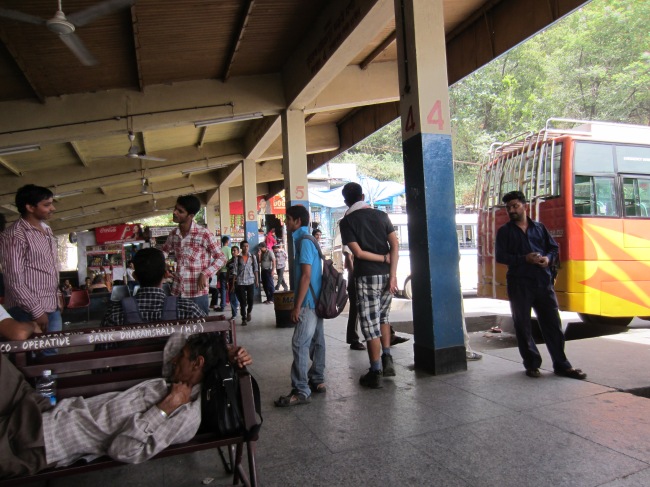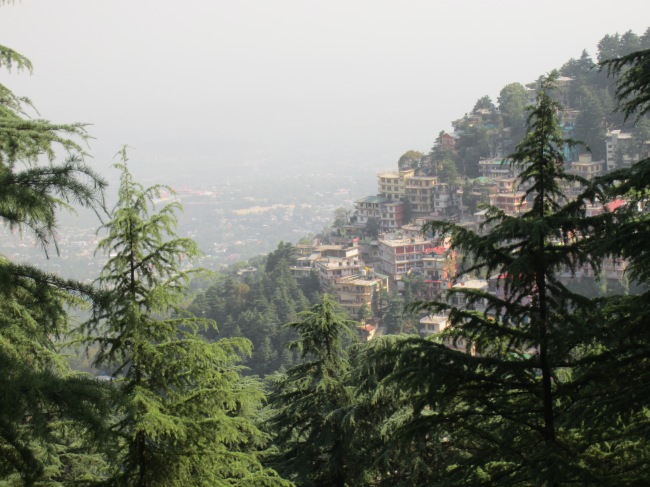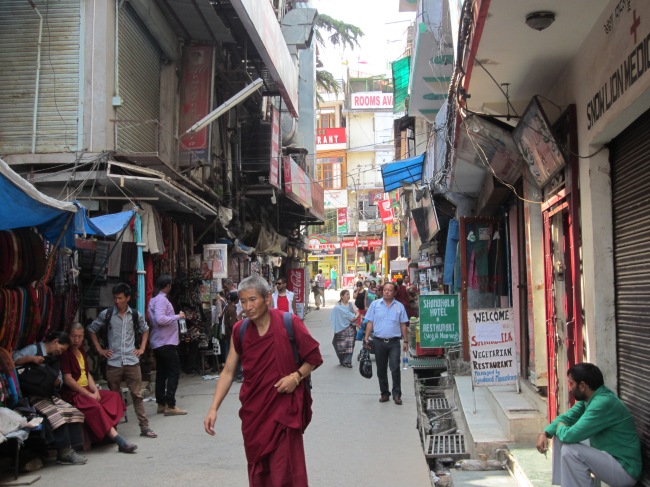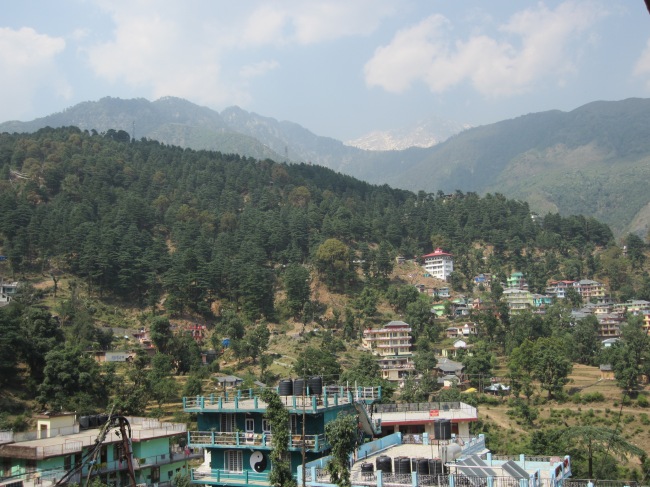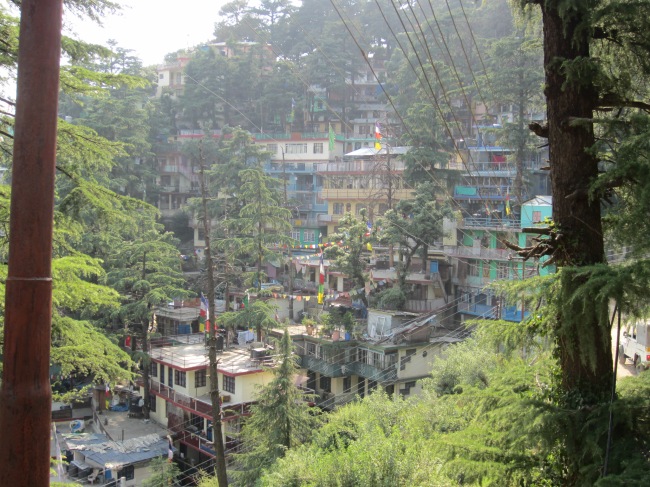Louis Versus India Railways (Part II)
Leave a commentMay 27, 2013 by Louis Ritzinger
Well, my time in India is down to just one week.
I know this to be the case, can see it visually confirmed each time I look at a calender and notice the shrinking gap between the present and my scheduled departure, and yet I somehow feel as though it will not come. As though it will always remain somewhere off in the distance. As though the daily patterns I have set myself to will just continue to go on. Which of course they will, minus one sweaty foreigner snaking his way along the side of the road.
Its interesting that I do not find myself noting the last of everything as I did before I left the States. My last Urdu class, last time getting lunch from the same old chaat stand in Kailash Colony Market, even my last day of work, all passed without me really thinking all that much about them. There are still a host of “lasts” left, but I suspect my not acknowledging them has a great deal to with my present inability to visualize my departure. Until that happens, on some level, it will always feel like there will be a next time. That the rhythm will go on. That nothing is changing.
Its not that I haven’t looked forward to my return home. I have, on certain occasions, gone so far as to open the calender feature on my flimsy Nokia cellphone to count down the days. I have watched friends go back with a tinge of jealousy that they were returning to the comforts of home. The loved ones, the food, the ease of routine that comes with life in the “developed” world. This was always, however, with the assumption that my turn to go was somewhere far away. Its easy to want what you can’t have.
Its not that I’m not ready to go back. Its more that I’m not quite ready to leave. Starting new chapters, even resuming old ones, is exciting. Its just a shame it always means leaving other ones behind, if only for the time being.
If there’s one part of living in India I won’t miss, however, its my periodic bouts with Indian Railways (see my earlier entry) – specifically the arcane, soul-crushing gauntlet one must overcome to get tickets less than a week or two in advance. My last week would not be complete without facing down my old nemesis one last time.
To be fair (and this is hard for me, given the carnage inflicted upon my pride over the past few days), there are certain quirks of mine which make me particularly incompatible with Indian Railway’s – shall we say – unconventional method for purchasing tickets. These include my aforementioned distaste for being manhandled by large groups of strangers; lack of skin pigmentation, which leaves me prone to sunburns should I be required to stand in 110 degree heat for, say, 3 hours; as well as an intolerance for bureaucratic shuffling. Most detrimental to my and Indian Railways’ relationship, however, is my desire for certainty – specifically my inclination (bordering on obsession) to plan things out ahead of time when I travel. This, I suppose, is rooted in a need for control, and makes it very difficult for me to be flexible and do things on the fly. I like to know where I’m going, how I’m getting there, and when I should leave, which I then do about 40 minutes earlier than I have to.
Its a little neurotic, I know. The first step is admitting you have a problem.
Anyway, this weekend I decided I could use a little time up in the mountains, away from Delhi’s stifling, smog-saturated heat, in Mcleod Ganj, a small town perched a few miles via narrow, knotted mountain roads from Dharamsala. Best known as the home of the Dalai Lama and the seat of the Tibetan government in exile, the area is also quite popular with the backpacking and hippie-inclined crowd. Traveling from Delhi requires an overnight train to Pathankot (a garrison town in Punjab), followed by a series of bus rides, totally about 4 hours, up into the mountains. The alternative to the train is a 12 hour overnight bus, which I was eager to avoid.
Now, planning your trip well in advance can save you quite a bit of suffering. However, due to circumstances beyond my control, I found myself waiting in the tak kal line at 8am Wednesday morning – the day before my desired train departed. Tak kal, for the uninitiated, is a system whereby certain tickets are reserved by Indian Railways for the day before a train is scheduled to depart, the idea being that certain people (such as myself) may need to purchase tickets at the last minute and, given the popularity of train travel here, tickets tend to sell out weeks ahead of time. It is, in theory, a pretty good idea.
As with any idea, however, execution is key, and as with many theoretically good ideas, the tak kal “scheme” leaves something to be desired in the execution department. The main problem, as tends to be the case in a country of over 1.2 billion, is scale.
I was warned by my roommate, Lavy, that going to the station to wait in the tak kal line would be a “hellish experience.”
“There’s a good chance you will be disappointed,” he told me, raising his eyebrows, “but…” he hesitated. “You wouldn’t want to not get tickets and then wish you had tried.”
With that resounding pep talk, I made the call to get up the next morning at 6 am, take the 40 minute metro ride to the railway station, navigate my way through the station and over the railway tracks (a task which sounds far easier than it is), and walk down the street the ticket booking office. Lavy had instructed me to bring a copy of my passport. The only copy I had, however, was left over from last summer when I was getting my visa and was showing its age. I decided I wouldn’t take any chances and grabbed my actual passport instead. This would prove to be a fatal mistake.
The main flaw with tak kal is that all of the tickets for trains leaving the following day, be it at 12:10 am, or 11:50 pm, are released at the exact same time – supposedly 10 am, but in reality it tends to start a bit earlier. If you aren’t in line by 8, you can pretty much forget about it. I arrived around 7:45 to find a queue snaking about 100 yards down the road. The morning sun was picking up strength and had already pushed the thermometer to around 90 and counting. Fortunately, a 10-foot high cement wall offered some relief to us would-be travelers, who migrated to its side to remain in its receding shadow for as long as possible. Men (women waited in a separate, shorter line on the other side of the entrance) stood patiently, or leaned against the wall reading newspapers and smoking cigarettes amongst the fruit juice vendors, whose thick sticks of incense perfumed the surrounding air with heavy curls of sweet smoke. Some gave updates to the fortunate individuals who had paid them to wait in line on their behalf via cellphone, holding copies of their ID cards carefully in their hands.
Soon after I arrived I heard the rusted gates of the reservation office grind open, and we began to shuffle gradually into the open-air courtyard in front of the office, whose white paint peeled and flaked from its concrete facade in the sunlight. Mustached police officers cajoled and prodded us into a zig-zag formation under the gracious shade of a massive tree, rising defiantly through the pavement. Hearty brown vines dangled from its branches, just above our heads. Some men elected to sit cross-legged on the ground, but I followed the lead of those around me and remained standing, my right hand covering my pocket where my passport sat, dampening with sweat.
After another hour an older man in glasses and a white labcoat emerged from the office carrying a clipboard and began checking the documents of the early-birds at the front of the line. A wave of impatient murmuring and jostling for space broke out at his sight, but was quickly quelled by three or four police officers, who barked out orders as beads of perspiration accumulated on their foreheads, rolling down their cheeks before falling to the ground. I couldn’t help but feel sorry for them in their full-length cotton uniforms and hats. By now it had to have been around 95-100.
It was around this time that I began to notice that I seemed to be the only one without a paper copy of my ID. My concern grew as I overheard one of the men making rounds through the line, handing out tickets request forms (every Indian Railways transaction requires a form of one kind or another), mention that the ticket vendors would be collecting the ID copies.
“Do we need a copy of our IDs?” I asked the man in front of me.
“You speak Hindi?!” He replied, “where are you from?” As he spoke, four or five other men turned their heads, smiling curiously.
Torn between not wanting to be rude, but needing an answer as soon as possible, I replied that I was from the US, was learning Hindi (which is often easier than explaining why I’m learning Urdu) and that I really needed to know if an ID copy was required, or if an original would suffice.
The man looked concerned, cocked his head to the side, and informed me that we needed a copy to give to the ticket vendor. My heart sunk.
“Are there any copy machines here?” I asked, pointing to the stalls that lined either side of the courtyard, selling juice and snacks.
He shook his head.
I weighed my options, although there really weren’t many. After careful consideration, I settled on shuffling away despondently while cursing under my breath – which I personally thought was a nice touch. As I made my way back outside the gate, I gave Lavy a call.
“Louis, I told you to bring a copy,” he chided, his voice still groggy with sleep.
“I know you did,” I snapped back, exasperated, “but I brought the original because I thought it would be better, I didn’t want to take any chances!”
“Louis. What are you saying.”
I took a breath. “Look man, I know I sound really stupid right now. But you have to understand, some of this stuff just doesn’t make sense to me.”
I decided that I would try to see if any travel agents had tickets left over before finding a place with a copy machine in Paharganj – Delhi’s backpacking tourist hub and the location of the hotel I stayed at during my first trip to the city in October. A few did, but not at any price I was willing to pay, so, with copy in hand, I made my back to the booking office. At this point it was around 9:45, and, as I mentioned earlier, my odds of getting a ticket were quite diminished. Fortunately, Lavy and I had devised a scheme of our own.
This being 2013, tak kal tickets are also available online – released at 10am sharp. Thus, our plan was that, as I waited in line, Lavy would simultaneously try and purchase the tickets through the Indian Railways website. Unfortunately, much like the situation at the station, the flood of ticket-seekers tends to overwhelm the system, making buying tickets this way extremely unreliable (hence my earlier decision to actually go to the station). With both of us trying our luck, however, we figured the odds were pretty good.
By the time I reached the courtyard once again the line outside had shrunk to around 30 or so people, and we were quickly ushered in to the dingy (but air conditioned) office. The place was packed with anxious travelers, who assembled in lines of about 20 in front of the ticket counters, which ran 24 deep along the length of the room. The vendors sat calmly behind a long glass separator, coated with finger prints, grime, and tape residue from long-since-removed fliers. Small electronic signs hung above each window, displaying the name of the train that was currently being sought, the class, as well as the present availability of tickets.
“AVAIL,” for instance, means that you can purchase confirmed tickets, guaranteeing you a spot on the train.
A “WL-6,” meanwhile, means that you are number 6 on the waiting list. In other words, if 6 people cancel their reservations before the final seating charts are drawn, you’re on.
A “REGRT” sign, on the other hand, means that there are no tickets left for purchase, even on the wait list.
I settled on a line somewhere around the middle of the office and took my place in the back, passport photocopy and ticket request form in hand. It was around 10 o’clock, and Lavy gave me a call.
“Louis,” he said, as if trying to suppress excitement, “there are tickets still available. I’m trying to book them now.”
With those words I felt my spirits surge. My shoulders perked upright, and suddenly the room seemed a little brighter. I waited patiently, imbued with a new sense of confidence. About 20 minutes later, halfway through the line, I got another call. It was Lavy again.
“Louis, I’m trying to get the tickets. I’m still seeing there are about 15 available, but the payment won’t go through.” Being a local seasoned veteran didn’t seem to make him any more impervious to the frustration of the moment. “This is just so irritating,” he muttered through clenched teeth.
Still (foolishly) hopeful, I waited another 20 minutes until I heard my phone ring again. The tickets were gone. I was third in line.
Determined to drag myself across the finish line, I waited it out and purchased a wait list ticket – number 13 – and made my way back home. Tired, hot, and defeated.
The thing that scares people like me about the concept of the wait list is its uncertainty. You may have a seat. You may not. And you probably won’t know until just a few hours before your train is supposed to leave. So much for planning in advance. Its a roll of the dice, and while sometimes they may be loaded in your favor, that nagging feeling of the unknown tugs at the back of your brain.
By the time I reached the apartment Lavy had already drawn up a whole series of alternatives should my tickets not be confirmed. Eventually, it was settled that I would go to the station a few hours before my waitlisted train was scheduled to depart (9:30 pm) and buy tickets at the station for a 7:15pm train to a different city that still had seats remaining, from where I could catch a bus from Mcleodganj. Should these sell out at the last minute, I could take the metro a few stops north and catch one of the dreaded overnight buses. We would find out of my original tickets were confirmed by 7pm, at which time I could return the 7:15 train tickets for a partial refund.
Seeing the options laid out in front of me did little to ease my mind, still steeped in disappointment and simmering from the heat. Even if all went according to plan and my tickets were confirmed, I would take an overnight train to Pathankot and then have to catch a series of buses to Mcleodganj. Where, exactly, did they leave from? What time did they depart? What if I got on the wrong one? What if they, too, were sold out?
Lavy looked up from the pad of paper on which he was busy scrawling out written instructions for his poor, confused friend. Eyebrows raised, he chided me mid-sentence.
“Louis, really, you must relax.” My mouth closed and my eyes fell to the floor, before looking up sheepishly. “There are many, many bigger things to worry about in life. You will get there. Just trust me.”
To make an already long story just a little bit shorter, I got one more call the next evening outside the New Delhi Railway Station in the fading evening sun. My ticket, after all this, was confirmed. I boarded the train at 9:15 from a teeming, humid platform and slept through the night on an upper-level cot. At 5:30 the next morning I arrived at Pathankot, stepping out into the tiny station in dawn’s early orange glow. A 15 minute ride in a shared auto rickshaw brought me to the bus depot, where a rattling, rusted out coach bound for Dharamsala was due to depart in half an hour.
The morning’s cool mountain air blew through open windows as the engine strained to pull us up through the Himalayan foot hills, stopping periodically, and seemingly at random, to pick up and drop off additional passengers along the way. After another quick bus change at a bustling intersection three hours later I found myself at the Dharamsala taxi stand, from where I hailed a cab, proudly emblazoned with the word “tourist” in bright blue ink along its side, to take me the remaining 5 kilometers up the sheer, gnarled pass into the main market, honking and grinding gears to avoid the villagers, animals, dread-locked hippies and saffron-clad monks clogging the narrow street.
Looking out the window to the right the town formed a semi-circle. Buildings clung impossibly to the mountain’s edge, staring down onto the valley below, whose lips curled inward as if two cresting waves. A snow-topped peak towered upwards in the distance, framed by two smaller wooded hills. The gritty smell of soot, livestock and soil from the vegetable stands that lined the street was no far cry from Delhi’s urban odor, but the light, crisp air which held the scent aloft made it all somehow refreshing. I felt free, independent, and yet indelibly connected to the life that swirled around me.
I had made it. Now on to the bigger things.
